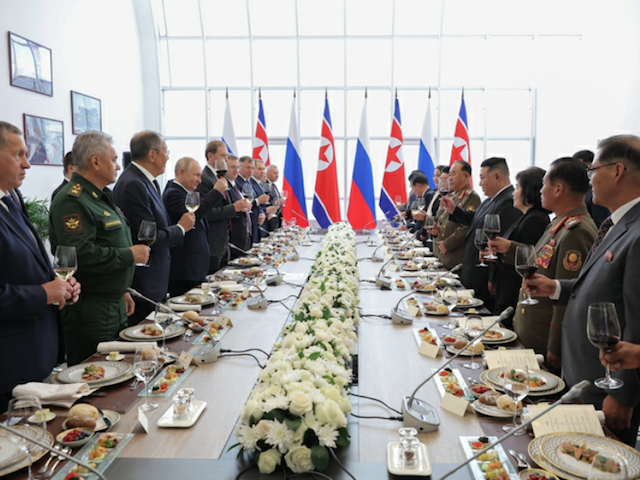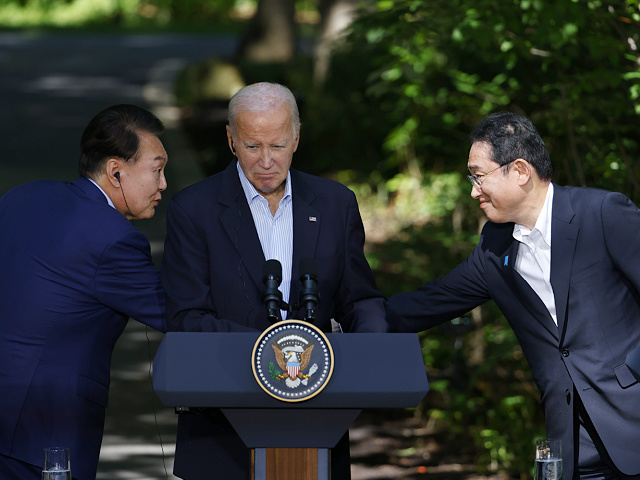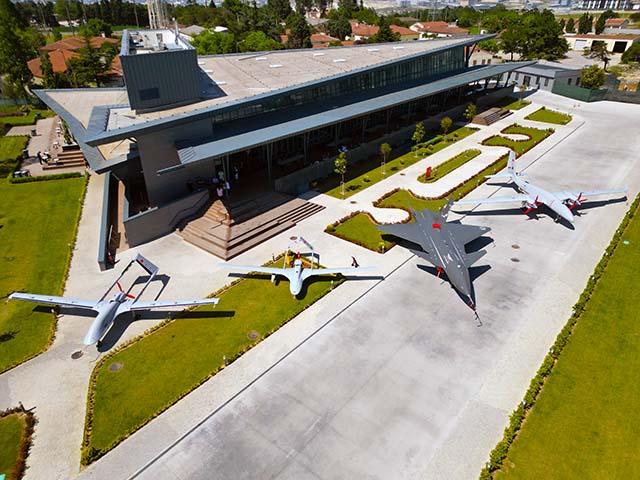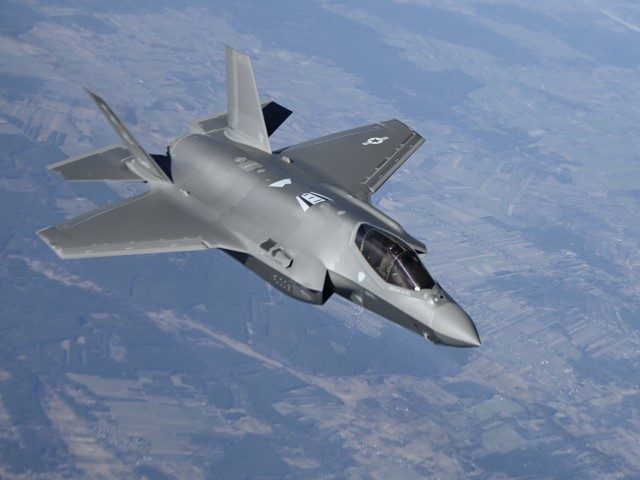The U.S. State Department on Wednesday approved a $5 billion sale of advanced F-35 fighter jets to South Korea, a week after South Korean and Turkish presidents Yoon Suk-yeol and Recep Tayyip Erdogan discussed plans for Seoul to invest heavily in Turkish drone technology.
The State Department notified Congress that South Korea’s F-35 purchase was approved on the day after Russian President Vladimir Putin met North Korean dictator Kim Jong-un to discuss closer cooperation between the two militaristic authoritarian regimes.
Although neither government has confirmed it yet, Russia is widely expected to buy stockpiles of old Soviet munitions from North Korea to resupply its invasion force in Ukraine. Kim expressed great interest in Russian satellite technology, which would help North Korea jump-start its faltering satellite launch program – and greatly improve its long-range ballistic missiles.

Russian strongman Vladimir Putin hosts a recception for North Korea’s communist dictator Kim Jong-un in far-east Russia, September 13, 2023
The State Department said Seoul’s acquisition of 25 F-35 fighters will “improve the Republic of Korea’s capability to meet current and future threats by providing credible defense capability to deter aggression in the region and ensure interoperability with U.S. forces.”
“The proposed sale of this equipment and support will not alter the basic military balance in the region,” the State Department added, anticipating North Korea’s inevitable accusations that Washington is beefing up South Korean forces to launch an invasion against the Kim regime.
The State Department noted that South Korea “already has F-35s in its inventory,” so it should have “no difficulty” managing additional warplanes. The new planes, spare engines, support equipment, and training included in the package will “augment Korea’s operational aircraft inventory and enhance its air-to-air and air-to-ground self-defense capability.”
The F-35 is a top-of-the-line multi-role aircraft with stealth capabilities that can be armed with fifth-generation weapons for both aerial combat and ground strikes. As the Defense Security Cooperation Agency indicated, the F-35 program was intended to provide a highly flexible platform that can smoothly integrate with allied forces, features that are both of great interest to the South Korean military.
Bloomberg News observed on Tuesday that F-35s have been selling extremely well ever since Russia invaded Ukraine. Twelve military services around the world have announced they have operational F-35s in their inventories.
Several media organizations linked the South Korean fighter jet purchase to the trilateral summit between the United States, Japan, and South Korea at Camp David on August 18. While the outcome of the summit might have accelerated State Department approval for the deal, South Korea began the acquisition process over a year ago, in July 2022. Delivery of the planes and parts is not expected to be complete until 2028.

Fumio Kishida, Japan’s prime minister, from right, U.S. President Joe Biden and Yoon Suk Yeol, South Korea’s president, at a news conference during a trilateral summit at Camp David, Maryland, US, on Friday, Aug. 18, 2023. (Ting Shen/Bloomberg via Getty Images)
Seoul is also keenly interested in improving its drone capabilities, especially after an embarrassing incident in December 2022 when a swarm of North Korean drones flew across the border and even threatened Seoul’s airspace, sowing confusion among South Korean defense forces.
President Yoon criticized his military’s response to the provocation, saying it demonstrated “a substantial lack of our military’s preparedness and training for the past several years, and clearly confirmed the need for more intense readiness and training.” The military offered a public apology for its inability to intercept the North Korean unmanned aerial vehicles (UAVs) and promised to improve its drone warfare capabilities.
To that end, Yoon met with Turkish President Recep Tayyip Erdogan on the sidelines of the G20 summit in New Delhi, India, last week to discuss expanded defense industry cooperation, especially on drones.
Turkey is an enthusiastic customer of South Korean tanks and artillery, and in turn it can offer the world’s hottest UAV product, the Bayraktar TB-2 combat drone. Turkey’s drones turned heads around the world after Ukraine used them to great effect during the early stages of the Russian invasion.

500th Bayraktar TB2, Kizilelma, Bayraktar TB3 UAV and Bayraktar Akinci are seen during a ceremony in Istanbul, Turkey on June 23, 2023. (Baykar/Handout/Anadolu Agency via Getty Images)
On September 1, the South Korean Joint Chiefs of Staff inaugurated a new unit called the Drone Operations Command. Conceived in the aftermath of the December incursion by North Korea, the new command includes elements of South Korea’s ground, air, and naval forces, promising an “immediate and overwhelming response” to any further UAV provocations.
The Defense Ministry said the new command would “carry out strategic and operational missions in the joint battlefield area through the utilization of drones and become a leading unit in advancing the development of drone operations.”
Drone Operations Command officials told South Korean media their plan is to overwhelm North Korean incursions by “outnumbering them more than ten to one,” an objective that requires the combination of performance and low cost that Turkey’s Baykar corporation has developed a reputation for providing.

COMMENTS
Please let us know if you're having issues with commenting.